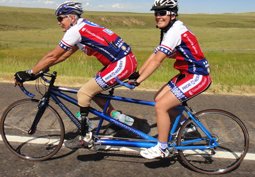By: Dann Denny – The (Bloomington, Ind.) Herald-Times via AP
BLOOMINGTON, Ind. — Shortly after returning from a year of military service in Iraq with the 101st Airborne Division, Efrain Fuentes became virtually housebound. Suffering from a severe back injury and post-traumatic stress disorder, the 50-year-old was terrified to tread outdoors. A trip to the grocery store caused panic.
But today, thanks to a six-day bike ride earlier this month with other injured war veterans, Fuentes is a new man.
“It was life-changing,” he told The Herald-Times. “I can hardly talk about it without getting tears in my eyes.”
Pedaling a recumbent bicycle designed to decrease pressure on his ailing back, Fuentes rode from New Orleans to Tallahassee with 180 other war veterans with physical or mental disabilities. The event was organized by Ride2Recovery, a nonprofit organization that seeks to rejuvenate injured war veterans through long-distance cycling events.
Fuentes pedaled most of the 384-mile trip, riding only 69 of those miles in a support van to rest his weary legs. He also got periodic help from “pushers,” stronger cyclists who would attach poles to the bikes of struggling cyclists to help push them along.
“There were times when I really needed their help,” Fuentes said of the pushers. “Then once my legs got a rest, I would start pedaling again.”
When Fuentes began two months of training at the Twin Lakes Recreation Center to prepare himself physically, he weighed 249 pounds and had a 44-inch waist. After completing the ride, he weighed 236 pounds and boasted a 40-inch waist.
“I feel a lot stronger and feel better about the way I look,” he said. “Before, I was embarrassed to go out in public because I felt people were staring at my big stomach.”
During his six years as a recluse, Fuentes said, he missed the camaraderie with his military buddies.
“During those six days, I got that back,” he said. “We cried together and laughed together and pushed each other to keep going.”
At one point in the trip, Fuentes told his comrades his body had reached its physical limit and he couldn’t go on. But they wouldn’t let him quit.
“They said, ‘Keep going. We know you can do it,’ ” he said. “They showed me there were still people who really understood me and cared about me.”
But Fuentes learned something else — that there are plenty of Americans who care about him as well and are grateful for his service to his country. Whenever the cycling contingent rolled through a town, schoolchildren and firefighters and police officers and city officials would line the streets — waving, offering them “high fives” and shouting “USA! USA!”
“It was beautiful,” he said. “It really lifted our spirits and touched us, especially seeing the schoolchildren out there.”
In Alabama, a mayor told the vets he’d ordered all 200 city employees to line the street, and to not return to work until the last veteran had passed by. Between towns, there were designated rest stops, where the USO and American Legion provided the cyclists with snacks and Gatorade.
Fuentes is now training for two more Ride2Recovery events — the Texas Challenge in April from San Antonio to Fort Worth, and the Great Lakes Challenge in August from Chicago to Detroit. He said he hopes other injured war veterans will sign up for these events.
“Ride2Recovery provides you with lodging and meals and with a special bike to accommodate you regardless of your disability,” he said. “On the last trip, there was a blind veteran and a double-arm amputee who were given adaptable bikes.”
Fuentes said the Ride2Recovery has given him the confidence to apply for admission to Indiana University. If accepted, he hopes to earn a degree in religion.
“My dream is to pastor a church in Bloomington that would welcome everyone, but focus on veterans, many of whom have unfortunately developed dependencies on drugs and alcohol,” he said. “I want to help pull them out of those addictions.”



